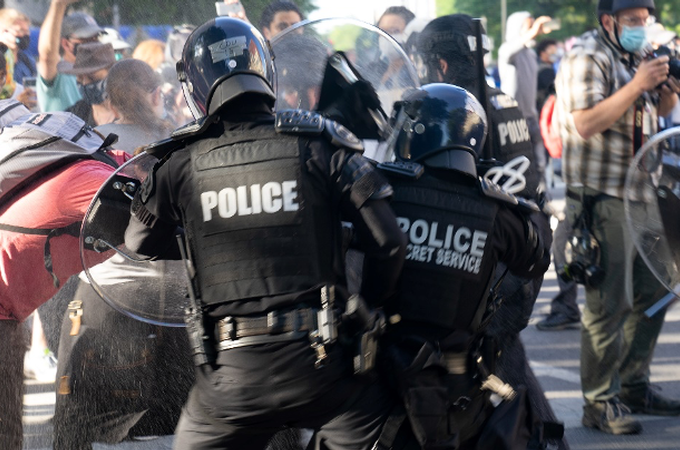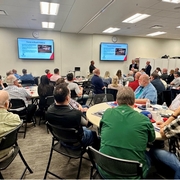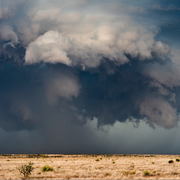Self-Defense or Second-Degree Murder?
October 27, 2020

Protest shooting may reveal hidden vulnerabilities within your ministry
By Craig Cable, Director of Ministry Safety and Strategic Partnerships, American Church Group of Colorado
On October 10, 2020, in Denver, Colorado, a 30-year-old private security guard who was hired to protect a Denver news crew while covering protests was involved in a deadly shooting that claimed the life of a 49-year-old man.
According to multiple witnesses and substantiated by cell phone video captured at the scene, heated words were exchanged between the two parties, which resulted in a physical altercation where the security guard was slapped. Within a matter of seconds, the protester raised a can of pepper spray while nearly simultaneously, the security guard drew a concealed pistol and fired a single fatal shot.
At first blush, this incident would appear to be far removed from any connection to your ministry. But from my perspective as a church security expert and security team trainer, I see several hidden vulnerabilities that could have significant implications for your ministry.
Vunlerability #1: Not All Ministry Security Team Members Understand the Reasonable Use of Force Standards
When it comes to the use of deadly force in the state of Colorado, certain criteria must be met to justify the use of a deadly weapon against another person. According to Colorado Revised Statute 18-1-704 Use of Physical Force in Defense of a Person, the two main criteria for deadly force are:
(1) Deadly force may also be used if in situations involving burglary or kidnapping. C.R.S § 18-1-704(2)(b)-(c).1 (2) the actor has reasonable ground to believe, and does believe, that he or another person is in imminent danger of being killed or of receiving great bodily injury.
The Denver District Attorney and the legal system will now have to determine whether the escalation of circumstances rose to the threshold of justification for deadly force. Did the security guard reasonably believe that his life and the life of others were in imminent danger of being killed or receiving great bodily injury? For ministry leaders, you must ask the question, does every member of your church security team understand what is a reasonable response to any level of force—including deadly force? Their understanding or lack thereof will have a direct impact on your ministry.
Vulnerability #2 Not All Ministry Security Team Members are Trained in the Use of Reasonable Force
This incident demonstrates how quickly a situation can deteriorate. Initially, the security guard appears to be a bystander, but quickly finds himself in a situation involving the use of force. As a sworn officer and a private security professional, I can tell you that under high-stress situations, an individual will typically fall back on their highest level of training. If they have been trained in force options like de-escalation or open-handed defensive techniques, they are more likely to utilize those skills when needed. If they have received little to no training, their decisions will more likely be based on fear and survival instinct.
A well-trained and practiced church security team will tend to make good decisions in a crisis. What decisions will your team make under extreme stress when the right answers are not glaringly clear?
Vulnerability #3 Not all Ministries Purchase Insurance Coverage for Security Related Incidents
Make no mistake, if a critical incident were to occur at your church, your ministry will never be the same. While we often think of protections in the physical sense, there should be protections in place that safeguard the health and well-being of your ministry, and the people who serve in it. We owe it to our congregations and our security team volunteers to care for their legal, physical, and emotional needs should you ever find yourself in a critical incident. For that reason, I implore the ministries that I work with to add two essential insurance coverages.
The first is the Security Operations Liability Coverage. This endorsement covers your church or ministry leaders, your employees, and your emergency response personnel while they are acting on your behalf with the scope of their delegated authority. This coverage provides for medical coverage, wage loss, individual and family counseling, and even damage or loss of security-related equipment.
The second essential endorsement is Traumatic Incident Response Coverage. This provides additional medical expenses, broadened wage loss reimbursement, and counseling to help heal the physical and emotional wounds of those who witnessed or were victims of the incident. It also provides reimbursement for temporary facility rental costs, for any expenses from additional security needs, and reimbursement costs for retaining legal counsel or a public relations specialist.
While we pray that violence would never come to your ministries, no one can predict where or when violence is going to occur. It is important to remain vigilant and prepared for any situation. Whether it’s a domestic incident in your children’s ministry area or a mentally unstable person in your lobby, it’s essential that your volunteers are trained, practiced, and protected so that your ministry can survive the incident and continue to thrive afterward.
To learn more about training opportunities that are available for your staff and church security team members, or the various coverages that Brotherhood Mutual Insurance Company® offers, I can be reached at CCable@AmericanChurchGroup.com.
Craig is a sworn peace officer and serves as a Reserve Deputy Sheriff for the patrol division at the Larimer County Sheriff’s Office. In addition to protecting our streets, Craig also helps protect county schools as a school marshal. Craig has trained hundreds of security team leaders and volunteers and was the lead developer of the Safe and Secure Church: The Ministry Approach training kit produced in partnership with Group Publishing and Brotherhood Mutual Insurance Company.
Source: FindLaw: For Legal Professionals. https://codes.findlaw.com/co/title-18-criminal-code/co-rev-st-sect-18-1-704.html
Copyright. © 2020 American Church Group of Colorado, LLC. All rights reserved. The information is this article is intended to help your ministry better understand issues of vulnerability and mitigate risks. It does not constitute legal advice between an attorney and a client. If specific legal advice is required, your ministry is encouraged to consult with a local attorney. Neither Brotherhood Mutual Insurance Company, American Church of Colorado, LLC, nor Craig Cable assume liability for reliance upon the information provided in this article.
- May 14, 2024
- Documenting an incident: Essential information you need to capture.
-

-
Of all the liability claims that Brotherhood Mutual pays out each year, bodily injury and medical claims are at the top of the list. If your ministry hasn’t experienced a slip-and-fall incident resulting in an injury, it is just a matter of time until you do.
- May 14, 2024
- Have you reviewed your Governance Documents?
-

-
For most churches, and many nonprofits, the end of the school year signals the end of the ministry year. Many of those same churches and nonprofits have fiscal year ends as of June 30. This is a great time to review what is commonly called your organizational “governance” documents.
- May 14, 2024
- Can Claims Be Avoided?
-

-
As I sit here in Kansas watching the news and reports of severe weather in my State and those States that surround me, I must remind myself, “there is not much I can do about this.” As a “fixer” this is difficult for me. The storms are going to roll in and at least we have the weather service who helps prepare us to “stay out of the way.” To answer my own question, we cannot avoid weather related claims.
- May 14, 2024
- From the Exiled Nigerian Prince to a Trusted Vendor: It's Time to Pay Attention to Cyber Threats
-

-
Remember the days when hackers were imagined as shadowy figures living in their parent's basements, playing video games, and eating Doritos while crafting scam emails? Well, that image is now outdated. The world of cybercrime has evolved, and it's both sophisticated and terrifying. According to a recent annual cyber claims report from an insurance carrier called, Coalition, the Federal Bureau of Investigation (FBI), received more than 880,000 complaints of cybercrime in 2023 with reported losses of $12.5 billion.
- April 11, 2024
- Mission Trip Fundraising
-

-
If your church or nonprofit engages in short-term, summer mission trips, this time often signals the beginning of fundraising projects. Before you appeal for donations, it is important to review the rules of what the IRS calls “deputized fundraising” making sure you have the proper policies and procedures in place to maintain compliance. Failure to maintain compliance could result in the loss of your tax-exempt status.
- February 19, 2024
- Is Your Facility Use Agreement Working For You?
-

-
With Valentine’s Day upon us and the official May-to-October wedding season not far behind, many couples are searching for the perfect wedding venue. Schools and performing arts organizations are looking for end-of-year performance and graduation venues. Your church or nonprofit facility might be the perfect match. Engaging the opportunity has stewardship and community outreach benefits. But opening your facilities to other activities and users involves risk. A Facility Use Policy sets the standard for your facility use. A Facility Use Agreement implements that standard. To be effective, leaders must answer three questions.
- February 19, 2024
- PART TWO: How protected are members of your safety team? The answer may surprise you.
-

-
The focus of this article is to address some of the risks and liabilities associated with having an armed safety team. Click here to read PART ONE.
- February 19, 2024
- Client Success Advisors at your Service!
-

-
Over the last few years, our agency has continued to grow and expand across the Midwest & Rockies, now spanning six states: Nebraska, North Dakota, South Dakota, Kansas, Colorado, and Wyoming. Serving over 3,000 ministries and nonprofit organizations, we are deeply grateful for the opportunity to support you.
- February 19, 2024
- 5 Predictions on What is Going to Happen in 2024's Church Insurance Market
-

-
Do you ever feel like some words just get overused? I do. I live in a house with two teenagers and a sweet little boy who watches everything they do. The word "literally", gets used in 80% of sentences... It isn't even impactful anymore. It means nothing. Because if they didn't use that word, I would just expect that most of what they were saying was metaphoric in nature.
- January 12, 2024
- Worker Classification Risk: Employee v. Independent Contractor
-

-
The new year signals the end of one payroll year and the beginning of another. As you process employee W2s and independent contractor 1099s, take time to evaluate a critical aspect of your ministry business risk management program: proper worker classification. While the percentage of the American workforce comprising “contingent workers” (independent contractors, contract employees, temporary employees, leased employees) was rapidly increasing before COVID, since COVID and the acceptance of the remote workplace, use of contingent workers has skyrocketed. You probably have several on your payroll.
- January 12, 2024
- How protected are members of your safety team?
-

-
Over the last few years, I have had the opportunity to speak with several thousand church safety team members across the country. By far the most common question I get from this group is “Am I covered if something bad happens?” This is not a question that only pertains to armed safety team members. Truth is, anyone who serves in the protection of a ministry should be asking that question. The purpose of this article is to help ministries be better informed and more prepared in advance of an incident occurring.
- January 12, 2024
- Stay Ahead of the Freeze: Sign Up for Text Alerts
-

-
We’re encouraging all customers to stay ahead of the freezing weather by signing up to receive Extreme Freezing Weather Text Alerts from Brotherhood Mutual. It’s new. The alert also links to actions you can take immediately to prevent or minimize damage to your buildings before forecasted weather arrives.
- January 12, 2024
- There's Something for Everyone at this Year's 2024 Ministry Boot Camp!
-

-
Join us for a comprehensive, one-day training for all! Tailored breakout sessions cover complex HR topics for administration and provides in-depth training, including a deeper review into de-escalation, for the security team. In the afternoon, unite in a deep dive on child safety with proprietary insights the anatomy of an abuse claim and protecting our youth.
- December 20, 2023
- Wishing you a Merry Christmas – 80s Style
-

- November 7, 2023
- Three common pitfalls that may be hidden in your church's lease
-

-
One positive aspect of today’s challenged economy is the availability of underutilized or empty commercial space. Before your ministry takes the plunge into a lease agreement, we want to make sure you're well-informed and prepared to avoid some common pitfalls.
- November 7, 2023
- Insurance Companies Are Forced To Respond To Unprecedented Market Strain. What Does This Mean For You?
-

-
In this month's perspective on the insurance market, I wanted to talk about the massive upward trending we are seeing in cancellation of policies. Our agency has observed a remarkable surge in inquiries from churches not currently under our insurance coverage. These churches are facing non-renewal by their existing carriers, a trend that has expanded beyond the norm of non-renewals due to excessive losses. Instead, carriers are now opting not to renew based on the risk profile of the ministry, which encompasses factors like geography, insured value, and construction type.
- November 7, 2023
- Umbrella for a Rainy Day
-

-
There are so many insurance policies to consider when it comes to protecting your ministry, and keeping track of each one’s coverages can be a mind-numbing task. One that I often hear confusion about is the Excess Liability policy, more commonly referred to as an Umbrella. While these terms aren’t exactly interchangeable in the broader insurance world, they do have a lot of overlap. For purposes of understanding your Brotherhood Mutual policy, they are basically synonymous.
- October 6, 2023
- The Crucial Role of Key Man Life Insurance for Church Pastors
-

-
In recent times, our team has observed a growing demand for key man life insurance, particularly within the realm of church leadership. Pastors are the spiritual pillars of their congregations, providing guidance, support, and a sense of community. While their spiritual contributions are invaluable, it's equally important to consider their financial well-being and the stability of the church should an unforeseen tragedy occur.
- October 6, 2023
- Wellbeing Resources for Ministry Leaders
-

-
The holiday season is fast approaching, and it's time to prepare for the festive cheer, delicious food, twinkling lights, and heartwarming gatherings. But amidst all the joy and celebration, let's take a moment to reflect on something essential - the well-being of our ministry leaders.
- October 6, 2023
- Stop Plumbing Leaks with FloLogic
-

-
Water damage due to plumbing leaks and frozen pipes is a leading cause of property claims for ministries. The damage is often made worse because ministry buildings are typically not in use every day. Last year, nearly 1,000 Brotherhood Mutual Insurance Company customers were impacted. To help protect ministries from experiencing costly water damage and disruptions, Brotherhood Mutual® recommends FloLogic, a comprehensive solution that can detect even the smallest water leak and automatically shut off the water to prevent flooding.